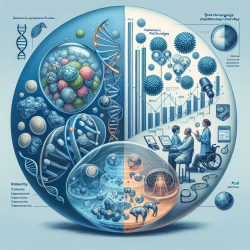Introduction
In the field of speech-language pathology, data-driven decisions are pivotal for optimizing therapeutic outcomes. The recent research article titled "Genome-wide association analysis implicates dysregulation of immunity genes in chronic lymphocytic leukaemia" provides insights that can be extrapolated to enhance practices in speech-language pathology, particularly in understanding genetic predispositions that may affect communication disorders.
Understanding the Research
The study conducted a meta-analysis of six genome-wide association studies (GWAS), identifying nine risk loci associated with chronic lymphocytic leukemia (CLL). These loci are linked to genes involved in immune function, highlighting the genetic underpinnings of CLL. Such insights into genetic predispositions can be crucial for speech-language pathologists when considering the broader health context of their clients.
Implications for Speech-Language Pathology
While the study focuses on CLL, the methodology and findings can inspire speech-language pathologists to consider genetic factors when assessing and treating communication disorders. Here are a few ways practitioners can apply these insights:
- Genetic Awareness: Understanding the genetic components of disorders can help practitioners tailor interventions more effectively. While not all communication disorders are genetically linked, awareness of potential genetic influences can guide comprehensive assessments.
- Interdisciplinary Collaboration: Collaborating with geneticists and other healthcare professionals can provide a more holistic view of a child's needs. This interdisciplinary approach can lead to more personalized and effective therapy plans.
- Research and Continuing Education: Speech-language pathologists should stay informed about genetic research and its implications for communication disorders. Engaging in continuing education and research can enhance their ability to integrate new findings into practice.
Encouraging Further Research
The findings from the GWAS on CLL emphasize the importance of genetic research in understanding complex disorders. Speech-language pathologists are encouraged to participate in or support research initiatives that explore the genetic basis of communication disorders. Such involvement can lead to breakthroughs in therapy techniques and outcomes.
Conclusion
Data-driven approaches, such as those demonstrated in the GWAS study on CLL, are invaluable in advancing the field of speech-language pathology. By integrating genetic insights and fostering interdisciplinary collaboration, practitioners can enhance their therapeutic strategies and improve outcomes for children with communication disorders.
To read the original research paper, please follow this link: Genome-wide association analysis implicates dysregulation of immunity genes in chronic lymphocytic leukaemia.










